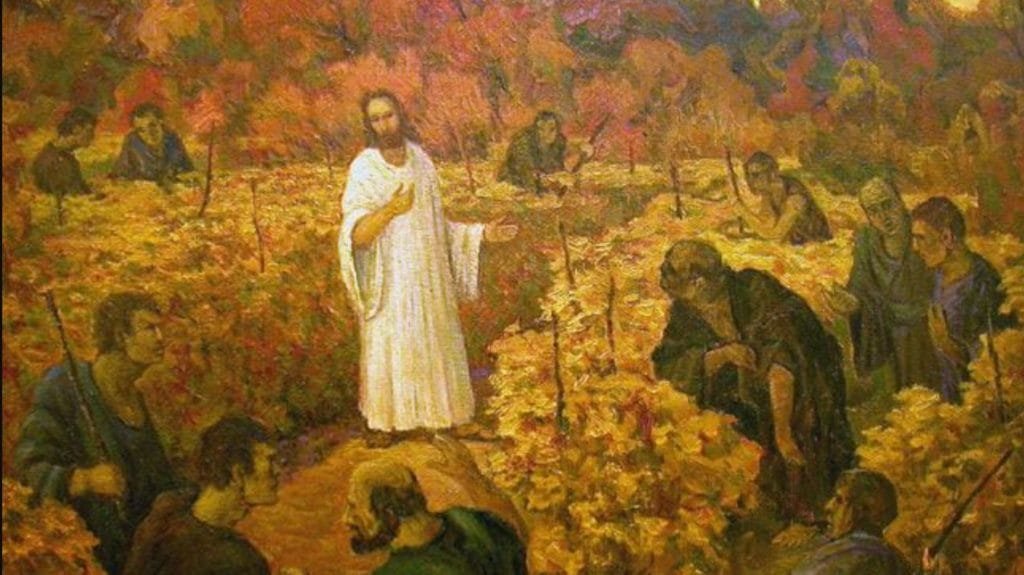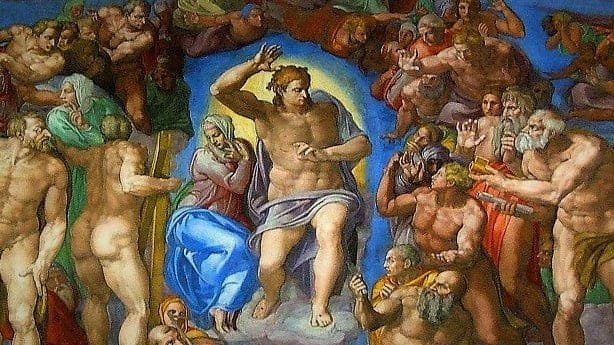POPE FRANCIS’ REFLECTION ON THE 25TH SUNDAY IN ORDINARY TIME YEAR A

ANGELUS
Saint Peter’s Square
25th Sunday in Ordinary Time Year A, 24 September 2023
________________________________________
Dear brothers and sisters, buongiorno!
Today’s Gospel presents us a surprising parable: the master of a vineyard goes out from the first dawn until evening to call in some workers, but in the end, he pays everyone equally, even those who have only worked one hour (cf. Mt 20:1-16). It would seem an injustice, but the parable is not to be read through wage criteria; rather, it intends to show us the criteria of God, who does not calculate our merits, but loves us as children.
Let us look more closely at two divine actions that emerge from the story. First, God goes out at all hours to call us; second, He repays everyone with the same “coin”.
First, God is He who goes out at all hours to call us. The parable says that the master “went out early in the morning to hire labourers for his vineyard” (v. 1), but then continues to go out at various times of the day until sunset, to look for those whom no one had yet taken to work. We thus understand that in the parable the workers are not only men, but above all God, who goes out all day without tiring. This is how God is: He does not wait for our efforts to come to us, He does not make an examination to assess our merits before seeking us out, He does not give up if we are late in responding to Him; on the contrary, He Himself has taken the initiative and in Jesus has “come out”-to us, to show us His love. And He seeks us at all hours of the day, which, as Saint Gregory the Great states, represent the different stages and seasons of our life up to old age (cf. Homilies on the Gospel, 19). For His heart, it is never too late; He is always looking for us and waiting for us. Let us not forget this: the Lord always seeks us and awaits us, always!
Precisely because He is so big-hearted, God – this is the second action – repays everyone with the same “coin”, which is his love. Here is the ultimate meaning of the parable: the labourers of the final hour are paid like the first because, in reality, God’s is a superior justice. It goes further. Human justice says to “give to each his own according to what he deserves”, while God’s justice does not measure love on the scales of our returns, our performance or our failures: God just loves us, He loves us because we are his children, and He does so with an unconditional love, a freely-given love.
Brothers and sisters, sometimes we risk having a “mercantile” relationship with God, focusing more on our prowess than on the generosity of his grace. Sometimes even as the Church, instead of going out at all hours of the day and extending our arms to all, we can feel like the first in our class, judging others far away, without thinking that God loves them too with the same love He has for us. And even in our relationships, which are the fabric of society, the justice we practise sometimes fails to break out of the cage of calculation, and we limit ourselves to giving according to what we receive, without daring to go the extra mile, without counting on the effectiveness of good done freely and love offered with a broad heart. Brothers, sisters, let us ask ourselves: do I, a Christian, know how to go out towards others? Am I generous towards everyone, do I know how to give that extra understanding and forgiveness, as Jesus has done and does every day with me?
May Our Lady help us to convert to God’s measure: that of a love without measure.
Source:https://www.vatican.va/content/francesco/en/angelus/2023/documents/20230924-angelus.html
Copyright © Dicastero per la Comunicazione – Libreria Editrice Vaticana
ANGELUS ADDRESS
25th Sunday in Ordinary Time Year A,
20 September 2020
Dear brothers and sisters, good day!
Today’s page from the Gospel (see Mt 20:1-16) recounts the parable of the workers called to put in a day’s work by the owner of the vineyard. Through this narrative, Jesus shows us the surprising way God acts, represented by two of the owner’s attitudes: the call and the recompense.
First of all, the call. Five times the owner of the vineyard goes out and calls [people] to work for him: at six, at nine, at twelve, at three and at five in the afternoon. The image of this owner, who goes out numerous times to look for day labourers for his vineyard, is touching. That owner represents God who calls everyone and calls always, at any hour. Even today, God acts this way: He continues to call anyone, at whatever hour, to invite them to work in His Kingdom. This is God’s style, which in our turn we are called to receive and to imitate. He does not stay shut in within His world, but “goes out”: God always goes out, in search of us; He is not closed up – God goes out. He continually seeks out people, because He does not want anyone to be excluded from His loving plan.
Our communities are also called to go out to the various types of “boundaries” that there might be, to offer everyone the word of salvation that Jesus came to bring. It means being open to horizons in life that offer hope to those stationed on the existential peripheries, who have not yet experienced, or have lost, the strength and the light that comes with meeting Christ. The Church needs to be like God: always going out; and when the Church does not go out, it becomes sick with the many evils we have in the Church. And why are these illnesses in the Church? Because she does not go out. It is true that when someone goes out there is the danger of getting into an accident. But it is better a Church that gets into accidents because it goes out to proclaim the Gospel, than a Church that is sick because it stays in. God always goes out because He is a Father, because He loves. The Church must do the same: always going out.
The owner’s second attitude, representing God’s, is his way of compensating the workers. How does God pay? The owner agrees to “one denarius” (v. 2) with the first workers he hired in the morning. Instead, to those he hired later, he says: “Whatever is right I will give you” (v. 4). At the end of the day, the owner of the vineyard orders that everyone be given the same pay, that is, one denarius. Those who had worked since morning are outraged and complain against the owner, but he insists: he wants to give the maximum pay to everyone, even to those who arrived last (vv. 8-15). God always pays the maximum amount: He does not pay halfway. He pays everything. In this way, it is understood that Jesus is not speaking about work and just wages – that is another problem – but about the Kingdom of God and the goodness of the heavenly Father who goes out continually to invite, and He pays everyone the maximum amount.
In fact, God behaves like this: He does not look at the time and at the results, but at the availability, He looks at the generosity with which we put ourselves at His service. His way of acting is more than just, in the sense that it goes beyond justice and is manifested in Grace. Everything is Grace. Our salvation is Grace. Our holiness is Grace. Giving us Grace, He bestows on us more than what we merit. And so, those who reason using human logic, that is, the logic of the merits acquired through one’s own greatness, from being first, find themselves last. “But, I have worked a lot, I have done so much in the Church, I have helped a lot and they pay me the same as this person who arrived last…”. Let’s remember who was the first canonized saint in the Church: the Good Thief. He “stole” Paradise at the last minute of his life: this is Grace. This is what God is like, even with us. Instead, those who seek thinking of their own merits, fail; those who humbly entrust themselves to the Father’s mercy, from being last – like the Good Thief – find themselves first (see v. 16).
May Mary Most Holy help us to feel every day the joy and wonder of being called by God to work for Him, in His field which is the world, in His vineyard which is the Church. And to have as our only recompense His love, friendship with Jesus.
SOURCE: http://w2.vatican.va/content/francesco/en/angelus/2020/documents/papa-francesco_angelus_20200920.html
EMPHASIS MINE.
ANGELUS ADDRESS
25th Sunday in Ordinary Time Year A,
24 September 2017
Dear brothers and sisters,
Good morning!
In today’s Gospel reading (cf Mt 20:1-16) [25th Sunday in Ordinary time Year A] there is the parable of the day labourers in the vineyard, which Jesus recounts in order to explain two aspects of the Kingdom of God: the first is that God wants to call everyone to work for his Kingdom; the second is that, in the end, he wants to give everyone the same reward, that is, salvation, eternal life.
The owner of the vineyard who represents God, goes out at dawn and hires a group of workers, agreeing with them on the day’s wages. It was a fair wage. Then he goes out again [several times] later in the day — he goes out five times on that day — until the late afternoon to hire other unemployed labourers whom he sees. At the end of the day, the landowner orders that a denarius be paid to everyone, even to those who had only worked for a few hours. Naturally, the labourers who were hired first complain because they see that they are paid as much as those who worked for fewer hours. The landowner however, reminds them about what had been agreed; if he then wants to be generous with the others, they should not be envious.
In reality, this “injustice” of the owner serves to provoke in those listening to the parable a qualitative leap because here Jesus does not want to speak about the issue of work or of a fair wage, but about the Kingdom of God! And this is the message: there are no unemployed people in the Kingdom of God. Everyone is called to do their part; and there will be a reward from divine justice for everyone in the end — not from human [justice], luckily! —, but the salvation that Jesus Christ acquired for us with his death and Resurrection, a salvation which is not deserved, but donated — salvation is free — thus, “the last will be the first and the first last” (Mt 20:16).
With this parable, Jesus wants to open our hearts to the logic of the Father’s love which is free and generous. It is about allowing oneself to be astonished and fascinated by the “thoughts” and the “ways” of God which, as the Prophet Isaiah recalls, are not our thoughts and not our ways (cf Is 55:8). Human thoughts are often marked by selfishness and personal advantages, and our narrow and contorted paths are not comparable to the wide and straight streets of the Lord. He uses mercy — do not forget this: He uses mercy —, he forgives broadly, is filled with generosity and kindness which he pours forth on each of us. He opens for everyone the boundless territory of his love and his grace, which alone can give the human heart the fullness of joy.
Jesus wants to make us contemplate the gaze of that landowner: the gaze with which he looks upon each of the labourers searching for work and calls them to go to his vineyard. It is a gaze which is filled with attention, kindness. It is a gaze which calls, invites one to get up and begin a journey because he wants life for each of us; he wants a full, committed life, safe from emptiness and inertia. God excludes no one and wants each of us to achieve his or her fullness. This is the love of our God, of our God who is Father.
May Mary Most Holy help us welcome into our lives the logic of love which frees us from the presumption of deserving God’s reward and from the critical judgement of others.
SOURCE: http://w2.vatican.va/content/francesco/en/angelus/2017/documents/papa-francesco_angelus_20170924.html
EMPHASIS MINE.
FOR THE 25TH SUNDAY IN ORDINARY TIME YEAR A 2023 MASS PRAYERS AND READINGS, CLICK HERE AND REFLECTION HOMILY HERE.
Stay updated: subscribe by email for free TO OUR NEW WEBSITE www.catholicsstrivingforholiness.org (PUT YOUR EMAIL IN THE SUBSCRIBE WIDGET).
We are also in www.fb.com/Catholicsstrivingforholiness. Kindly help more people in their Christian life by liking our page and inviting your family, friends and relatives to do so as well. Thanks in advance and God bless you and your loved ones! Fr. Rolly Arjonillo


